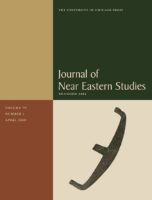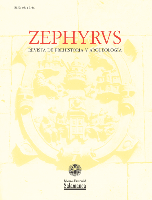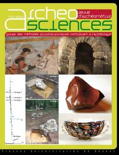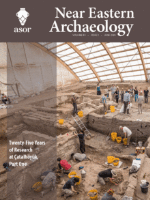
Complutum
Scope & Guideline
Illuminating the Intersections of Time and Culture
Introduction
Aims and Scopes
- Archaeological Research and Excavation:
The journal emphasizes original archaeological findings through excavation reports, focusing on diverse periods such as the Bronze Age, Iron Age, and Neolithic. It seeks to shed light on settlement patterns, social structures, and cultural practices of ancient communities. - Cultural Heritage Studies:
Complutum explores the significance of cultural heritage in contemporary society, addressing issues related to heritage preservation, management, and the impact of conflicts on cultural sites, reflecting a commitment to integrating archaeology with modern sociocultural contexts. - Interdisciplinary Approaches:
The journal promotes interdisciplinary research methodologies, combining archaeology with anthropology, history, and art history to provide a comprehensive understanding of societal development and cultural interactions across different epochs. - Theoretical Contributions:
Complutum not only publishes empirical studies but also encourages theoretical discussions in archaeology, including topics such as gender studies, ritual practices, and social dynamics, contributing to broader academic debates. - Technological Innovations in Archaeology:
The journal highlights the use of advanced technologies in archaeological research, such as 3D scanning and reflectance transformation imaging, allowing for innovative analyses and interpretations of archaeological data.
Trending and Emerging
- Funerary Practices and Mortuary Archaeology:
Recent articles increasingly explore burial practices and funerary archaeology, indicating a growing interest in understanding social identities, beliefs, and rituals surrounding death in ancient societies. - Cultural Identity and Material Culture:
There is a notable trend towards examining how material culture, particularly ceramics and artifacts, reflects cultural identities. This includes studies on regional styles and their implications for understanding social dynamics. - Conflict and Cultural Heritage:
The impact of contemporary conflicts, such as the Russo-Ukrainian War, on cultural heritage has emerged as a significant theme, highlighting the vulnerability of archaeological sites and the necessity for protective measures. - Technological Integration in Archaeology:
An increasing number of studies utilize advanced technologies, such as digital mapping and data analysis, to enhance archaeological research, signifying a shift towards more innovative methodologies in data collection and interpretation. - Gender Perspectives in Archaeology:
Emerging scholarship focusing on gender perspectives within archaeological research is becoming more prominent, analyzing how gender roles and identities were constructed and represented in ancient societies.
Declining or Waning
- Colonial and Postcolonial Studies:
There seems to be a reduced emphasis on colonial and postcolonial analyses in archaeological contexts, as fewer studies address how colonial legacies impact archaeological interpretation and heritage management. - Modern Urban Archaeology:
Research focusing on modern urban archaeology and its implications for heritage management appears to be less frequent, suggesting a potential shift back to more ancient periods rather than contemporary archaeological challenges. - Social Theories in Archaeology:
The application of broad social theories to archaeological interpretation, such as Marxism or post-structuralism, has diminished, with a more pronounced focus on empirical findings and specific case studies instead. - Public Archaeology:
While public engagement remains important, the direct focus on public archaeology initiatives and community involvement in archaeological processes has waned, indicating a potential need for revitalization in this area. - Environmental Archaeology:
There is a noticeable decline in the publication of studies specifically addressing environmental archaeology, such as paleoenvironmental reconstructions and the relationship between ancient societies and their environments.
Similar Journals

JOURNAL OF NEAR EASTERN STUDIES
Bridging Disciplines for a Deeper Understanding of the Near EastJournal of Near Eastern Studies (ISSN: 0022-2968; E-ISSN: 1545-6978), published by University of Chicago Press, stands as a cornerstone of academic discourse in the fields of Archaeology, Cultural Studies, and Linguistics and Language. With a prestigious track record that has evolved since its inception and spanning converged publication years from 1968 to 2024, this journal holds an impressive Q1 ranking in Cultural Studies and Linguistics and Language, and a solid Q2 ranking in Archaeology and Arts and Humanities as of 2023. Despite not offering open access, it is widely regarded for its rigorous peer-reviewed articles that contribute significantly to the understanding of Near Eastern history, culture, and languages. The journal's sustained recognition in Scopus rankings, including a notable 30th rank out of 173 in Arts and Humanities, ensures it remains an essential resource for researchers, academics, and students dedicated to exploring the rich tapestry of the Near East. With its base in Chicago, USA, the Journal of Near Eastern Studies continues to foster interdisciplinary collaboration and scholarly excellence.

Zephyrus-Revista de Prehistoria y Arqueologia
Advancing Knowledge in Prehistory and ArchaeologyZephyrus-Revista de Prehistoria y Arqueologia, published by UNIV SALAMANCA, EDICIONES, is a renowned academic journal dedicated to the fields of archaeology and prehistory. Since its inception in 1950, the journal has embraced an Open Access model, facilitating widespread access to cutting-edge research and scholarly discourse while fostering global collaboration among researchers. Based in Salamanca, Spain, this journal has achieved remarkable recognition, evidenced by its Q1 rankings in Archaeology and History as of 2023, and impressive Scopus standings across various categories, including an 83rd percentile in History. The journal's comprehensive scope since 2011 has made it a vital resource for academics seeking to deepen their understanding of human history through archaeological insights. Zephyrus not only provides a platform for disseminating innovative research findings but also serves as a bridge between historical scholarship and contemporary archaeological practices, ensuring that researchers, professionals, and students alike have access to the latest developments in the field.

ArcheoSciences-Revue d Archeometrie
Unveiling the Past: Bridging Science and ArchaeologyArcheoSciences-Revue d Archeometrie is a prominent scholarly journal dedicated to the field of archaeology, published by PRESSES UNIV RENNES in France. With an ISSN of 1960-1360 and an E-ISSN of 2104-3728, this journal has gained recognition for its focus on the intersection of science and archaeological research, aiming to foster interdisciplinary dialogue and innovative methodologies within archaeological studies. Although coverage of the journal has been discontinued in Scopus post-2021, it has maintained a respectable standing with a Q3 Quartile ranking in both the Archaeology (Arts and Humanities) and Archaeology categories as of 2023, as well as commendable Scopus rankings in relevant fields. As an accessible platform for researchers, professionals, and students, ArcheoSciences offers valuable insights into applied techniques and findings in archaeological science, making it an essential resource for those involved in the historical and cultural analysis of material relics. Researchers are encouraged to explore this journal to stay informed about frontier research and ongoing discussions in the discipline.

Spal
Innovating Insights into Our Shared Heritage.Spal is a distinguished academic journal dedicated to the fields of Archaeology and History, published by the University of Seville, Editorial. With an ISSN of 1133-4525 and an E-ISSN of 2255-3924, it has established a prominent reputation within the scholarly community, currently enjoying an impressive Q1 ranking in Archeology (Arts and Humanities) and History, alongside a Q2 ranking in Archeology for 2023. The journal serves as a critical platform for researchers, professionals, and students alike, promoting the dissemination of cutting-edge research and innovative methodologies in these vital disciplines. Spal's Scopus Ranks place it in the 84th percentile for Arts and Humanities - History and the 72nd for Archeology within the field, emphasizing its impact and relevance in contemporary scholarship. Although it operates under a traditional access model, its commitment to advancing knowledge and discourse in archaeological and historical studies remains unwavering. The journal's coverage spans from 2015 to 2024, positioning it well to contribute to ongoing academic conversations and foster collaborations within the global research community.

Pamatky Archeologicke
Elevating the field of archaeology with distinguished contributions.Pamatky Archeologicke is a premier journal dedicated to the field of archaeology, published by the Academy of Sciences of the Czech Republic, Institute of Archaeology. Renowned for its rigorous scholarship and insightful contributions, the journal holds a distinguished position within the academic community, featured in the Q1 category of both archaeology and arts and humanities as of 2023. With impactful research articles that span a broad spectrum of archaeological inquiry, Pamatky Archeologicke serves as an essential resource for researchers, professionals, and students dedicated to understanding cultural heritage and archaeological methodologies. The journal enjoys a significant Scopus ranking, having achieved an impressive percentile ranking in both arts and humanities and social sciences disciplines. Although it currently does not offer open-access options, the journal remains committed to advancing the field of archaeology through high-quality research and critical discussions. Its scholarly contributions are crucial for fostering knowledge and innovation in the understanding of human history and prehistory.

Southern African Humanities
Exploring the depths of anthropology and archaeology.Southern African Humanities is an esteemed academic journal published by the Natal Museum, dedicated to advancing the fields of anthropology, archaeology, and cultural studies with a particular focus on the Southern African context. Since its inception in 2008, the journal has consistently provided a platform for innovative research and scholarly discourse, earning a prominent reputation with a 2023 impact factor that places it in the Q2 and Q1 quartiles across multiple relevant categories, including Anthropology, Archaeology, and History. The journal is recognized for its rigorous peer-review process and dissemination of high-caliber research, exemplified by its Scopus rankings, which reflect its widespread influence within the humanities. Although it does not currently offer open access options, the journal remains pivotal for researchers, professionals, and students aiming to deepen their understanding of Southern African cultures and historical contexts. Located in Pietermaritzburg, South Africa, Southern African Humanities continues to be an essential resource for those engaged in the humanities, enhancing knowledge and fostering research collaborations within the region and beyond.

NEAR EASTERN ARCHAEOLOGY
Connecting Scholars to the Heart of Archaeological ResearchNEAR EASTERN ARCHAEOLOGY, published by University of Chicago Press, is a premier journal dedicated to the field of archaeology, particularly focusing on the rich cultural heritage and archaeological findings of the Near East. With an ISSN of 1094-2076 and an E-ISSN of 2325-5404, this esteemed publication provides a vital platform for scholars and practitioners to share their research, insights, and discoveries. The journal holds an impressive ranking in the Q1 quartile for both Archaeology and History in 2023, reflecting its significant impact within these fields and a robust history of scholarly contribution. The journal has been pivotal in shaping discussions around archaeological methodology, theory, and contemporary issues from 2002 to 2024, as it continues to reach a wide audience through various access options. With Scopus rankings placing it in the top percentiles for both History and Archaeology, NEAR EASTERN ARCHAEOLOGY represents an essential resource for researchers, professionals, and students alike, fostering the exploration and understanding of the region's archaeological narrative.

Stratum Plus
Navigating the Rich Tapestry of Human ExperienceStratum Plus, published by HIGH ANTHROPOLOGICAL SCH UNIV, is a distinguished academic journal based in Moldova that focuses on the fields of Anthropology, Archeology, and History. With an impressive impact factor reflecting its stature—ranked in the Q2 category for both Anthropology and Archeology, and Q1 for Archeology in the arts and humanities—this journal is a vital resource for scholars, professionals, and students alike. The journal's comprehensive scope encompasses a wide array of interdisciplinary studies, making it a beacon for innovative research and critical discourse within these disciplines. Since its inception in 2014, Stratum Plus has strived to foster academic excellence and knowledge dissemination, thus playing a crucial role in shaping contemporary anthropological and archaeological thought. While currently not available as Open Access, the journal maintains a strong online presence, with access options available through institutional subscriptions. Located at ZIMBRULUI 10A ST, KISHINEV MD-2024, MOLDOVA, Stratum Plus invites contributors and readers to engage with cutting-edge research that continues to enrich the global academic community.

California Archaeology
Bridging the Past and Present of California's ArchaeologyCalifornia Archaeology is a premier academic journal dedicated to the multifaceted study of archaeology within the context of California's rich historical and cultural landscape. Published by Routledge Journals, Taylor & Francis Ltd, this journal conveys cutting-edge research from 2009 to 2024 and is recognized for its impact in the field, with a commendable Q2 ranking in both archaeology and arts and humanities as of 2023. Scholars and practitioners are encouraged to disseminate their findings and insights through this journal, contributing to a deeper understanding of archaeological practices and interpretations in California. With access options designed to enhance the visibility of research, California Archaeology serves as an essential resource for professionals, students, and researchers devoted to advancing knowledge in archaeology, making it a cornerstone of academic discourse in the discipline.

Ancient Asia-Journal of the Society of South Asian Archaeology
Advancing Knowledge of South Asia's Archaeological TreasuresAncient Asia - Journal of the Society of South Asian Archaeology, published by ARF India, stands as a pivotal resource for the exploration and dissemination of archaeological research focused on the rich history and culture of South Asia. Since its inception as an Open Access journal in 2006, it has become an essential platform for scholars and enthusiasts alike, boasting an impressive range of quartile rankings across multiple disciplines, including Anthropology, Archaeology, History, and Visual Arts. With expansion into various indexed categories and consistent dissemination of impactful research common to this highly diverse field, Ancient Asia aims to foster interdisciplinary dialogue, facilitate collaboration among researchers, and enhance the global understanding of ancient civilizations within the region. By embracing an inclusive access model, the journal encourages wide readership and engagement, positioning itself as a key player for students, professionals, and academics interested in delving into the archaeological marvels of South Asia.